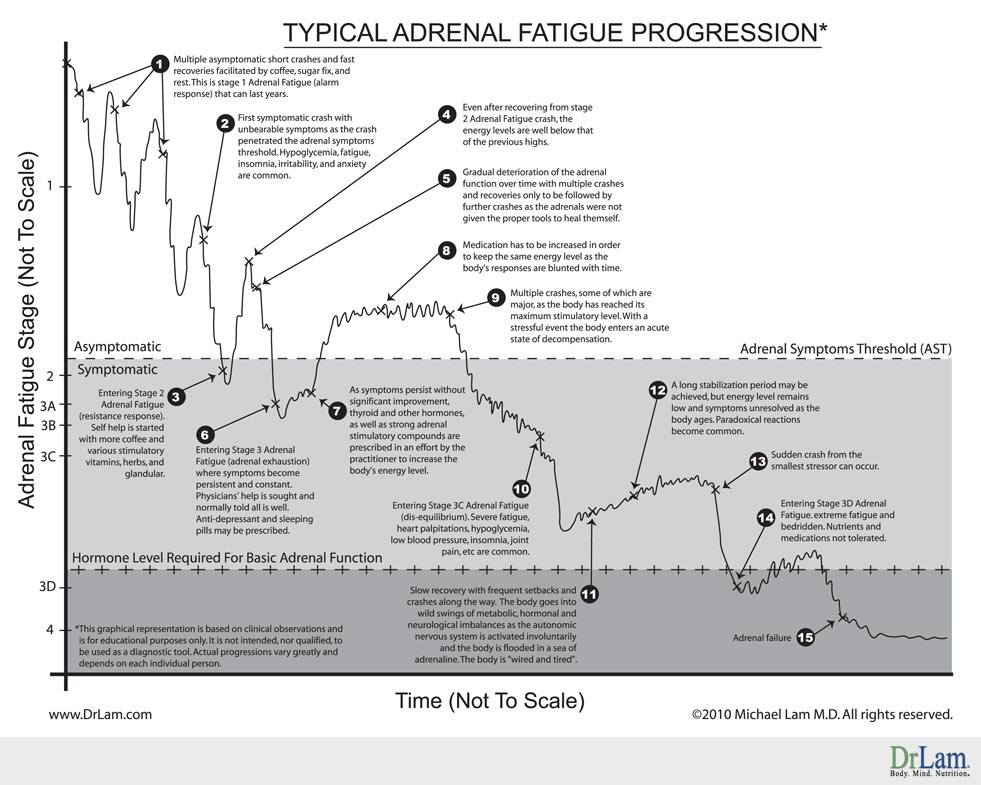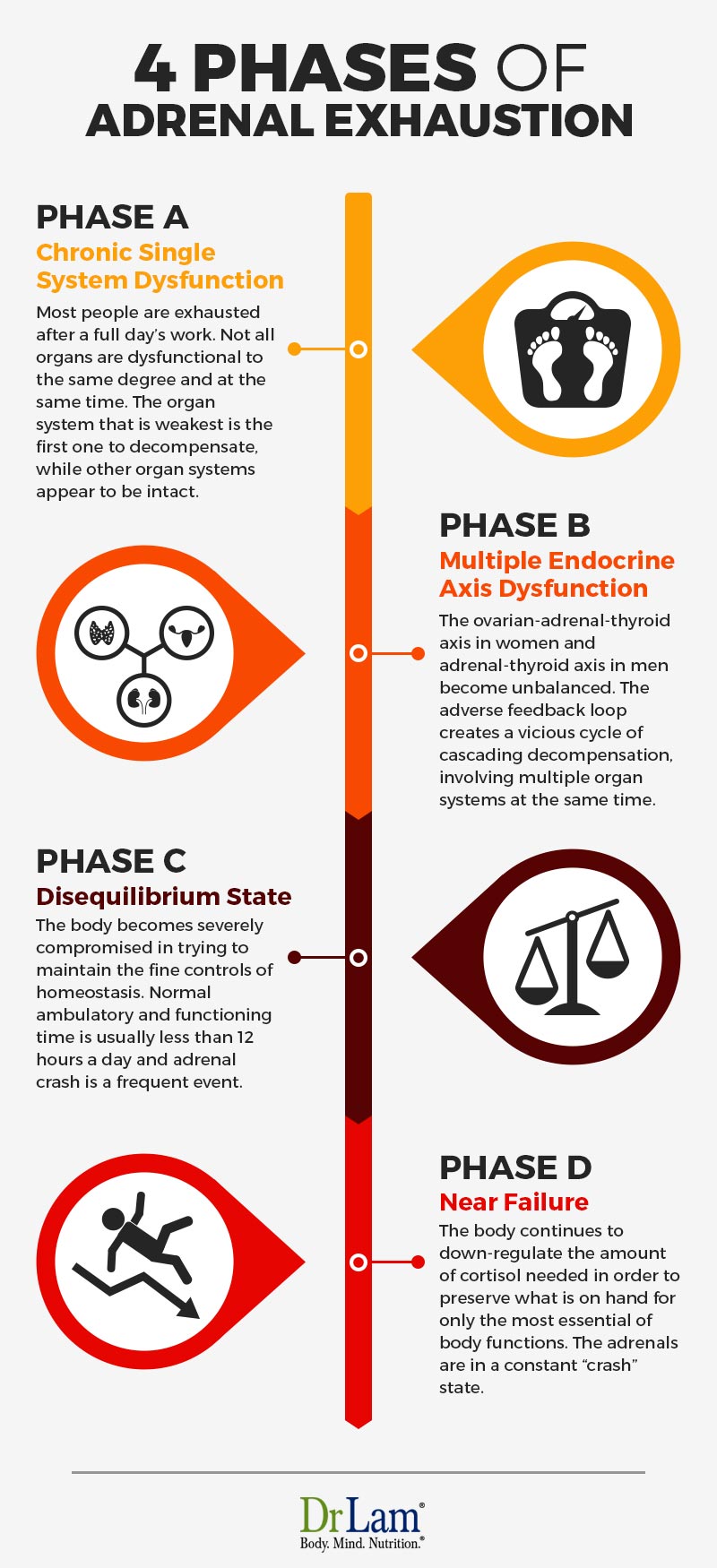 Adrenal fatigue has become synonymous with modern life. That’s because most of us live in a way that is so far removed from how we are naturally built to live. The daily stresses, both physical and mental, that we face are too much for our bodies to cope with. That’s why Adrenal Fatigue Syndrome (AFS) has become a very common condition, though one that is rarely diagnosed properly. Many people suffer from the various symptoms of this condition without knowing the root cause. Finding a healthcare practitioner well-versed in identifying the condition is thus important. In this article, we’ll be outlining the four stages of adrenal fatigue so you can get a better understanding of where you stand.
Adrenal fatigue has become synonymous with modern life. That’s because most of us live in a way that is so far removed from how we are naturally built to live. The daily stresses, both physical and mental, that we face are too much for our bodies to cope with. That’s why Adrenal Fatigue Syndrome (AFS) has become a very common condition, though one that is rarely diagnosed properly. Many people suffer from the various symptoms of this condition without knowing the root cause. Finding a healthcare practitioner well-versed in identifying the condition is thus important. In this article, we’ll be outlining the four stages of adrenal fatigue so you can get a better understanding of where you stand.
» Read our complete long-read article on the 4 stages of Adrenal Fatigue
» Adrenal Fatigue FAQs
» Take our 3-minute test to see if you may have Adrenal Fatigue
Your adrenal glands are what produce your body’s main anti-stress hormone, cortisol. If they are overworked, as is what happens when you’re constantly stressed, they begin to dysregulate. At first, they increase their output of cortisol until they can no longer do so, and then their cortisol output drops.
Symptoms of AFS include tiredness, weight gain, insomnia, anxiety, mild depression, an inability to handle stress, brain fog, lightheadedness, lowered immunity, low sex drive, PMS, infertility, hypoglycemia, sugar and salt cravings, heart palpitations, among others. Many people in our coaching program have these and other symptoms of adrenal fatigue. Depending on which of the four stages of adrenal fatigue you are in, the symptoms will vary in type and intensity.
The different stressors that can lead to or worsen the progression of adrenal fatigue include such things as:
The NeuroEndoMetabolic (NEM) Stress Response is what’s responsible for neutralizing the stress that can result from facing these stressors. It’s composed of different organs and systems organized into six circuits: The Hormone, the Bioenergetics, the Neuroaffect, the Cardionomic, the Inflammation, and the Detoxification Circuits.
The hypothalamic-pituitary-adrenal (HPA) axis is the hormone cascade that produces cortisol, and it affects every other hormone system in the body. Also, imbalances in other hormone systems due to whatever root cause is another big trigger for AFS. And that’s why we’ll also be looking at the Hormone Circuit of the NEM as we go through each of the four stages of adrenal fatigue. The Hormone Circuit consists of the adrenal glands, the thyroid, and the reproductive organs (female ovaries and male testes).
Though the journey of AFS is different for every person, the illustration below shows the typical progression of symptoms through the different stages of adrenal fatigue. You can use it as a guide to determine if any of these stages apply to your case.

When your body is first bombarded with different stressors, it goes into alarm mode. Your fight or flight response switches on, and it floods your body with different anti-stress hormones, such as adrenaline, norepinephrine, and cortisol. This response is a normal and healthy one when encountering stress in an acute setting. However if the stress prolongs, this alarm reaction can become chronic.
However, because this is just the first of the stages of adrenal fatigue, your symptoms at this point will be virtually unnoticeable. You might be a little more tired than usual, but if you’re like most people, you wouldn’t be affected enough to question this change. You might increase your intake of stimulants, such as coffee or energy drinks, to get through the day. You’ll still be able to maintain much of your focus and productivity, even if you no longer achieve peak performance.
Although your NEM is engaged at this stage, the Hormone Circuit is still able to work efficiently and produce the amount of anti-stress hormones needed.
Now the stress is chronic and the adrenal glands cannot produce enough cortisol to meet this growing demand. You enter the second stage of the four stages of adrenal fatigue, and it’s called the resistance response. Your fatigue starts to get in the way of your daily activities, and you notice your performance at work or at home decreasing.
You might also start to experience new symptoms such as anxiety, PMS, irritability, frequent colds and flus (and other infections), and insomnia. Even if you do manage to sleep, you don’t feel rested and refreshed afterwards.
At this stage, your NEM’s Hormone Circuit is starting to dysregulate. Your hormones go out of balance and different hormone systems begin to affect the other circuits like the Neuroaffect and the Inflammation Circuits.
Because AFS is not yet recognized by mainstream medicine, each symptom you report will most likely be treated as a separate condition. For example, if you complain of feeling depressed, you may be prescribed antidepressants. If you complain of fatigue, you may be put on thyroid medication. If you get blood work done and it shows hormone imbalance, you may be put on hormone replacement. However, routine labs will not show adrenal issues. So your medical practitioners will likely not address your adrenal fatigue and it will progress to the next stage.
When your adrenals have overworked to the point of exhaustion, their cortisol output drops significantly. However, you are still remaining at a high stress level and it starts to affect other circuits in the NEM stress response.
By now, you may have experienced one or more adrenal crashes. Recovering from each subsequent crash takes longer than before. The organs and systems that are not needed for survival, such as reproduction, slow down. Even digestion slows in order to conserve energy, and that’s why you can get symptoms such as constipation.
Having adrenal exhaustion means that now you’re unable to function normally, even with stimulants and other coping mechanisms. That’s what differentiates this stage from the other three stages of adrenal fatigue. We can further differentiate four phases of this third stage.
 In Phase A, the dysfunctions of single organs in the immune system, nervous system, and metabolism become chronic. Not all organs affected are affected to the same degree or at the same time. Symptoms from stages one and two become more severe and constant. You may have more pronounced insomnia and depression, as well as more frequently recurring infections. You can still pull off a full day’s work, but you’ll just find yourself needing to rest and sleep more.
In Phase A, the dysfunctions of single organs in the immune system, nervous system, and metabolism become chronic. Not all organs affected are affected to the same degree or at the same time. Symptoms from stages one and two become more severe and constant. You may have more pronounced insomnia and depression, as well as more frequently recurring infections. You can still pull off a full day’s work, but you’ll just find yourself needing to rest and sleep more.
A lot of people start to worry at this stage, and because they cannot find answers at their regular physician, they begin searching online. Unfortunately this can sometimes lead to the sufferers trying out different diets, supplements, or treatments that are not suitable for adrenal fatigue. Or if they are suitable to one stage or phase of adrenal fatigue, they may not be suitable for the stage or phase they are currently in. And that’s a key thing to remember when dealing with AFS: even making helpful changes can backfire due to the sensitivity of your system. For example, when your Detoxification Circuit is sluggish, taking supplements can add to the toxic load of your body as they aren’t processed in a timely fashion. Or trying to exercise, which is normally a very healthy thing to do, can lead to a crash. Alternately, changing your diet suddenly can add to the stress that you’re already facing.
This is why we caution everyone with AFS not to try to navigate recovery alone, at least in the beginning. Getting the right kind of help is what determines the success of a recovery journey. Our program helps identify your stage of adrenal fatigue and helps with designing the correct protocols to address the issue. Remember, there are many ways of addressing adrenal fatigue.
In Phase B, the dysfunctions in the previous phase spread to multiple organs. For example, the hormone axes of the Hormone Circuit can become dysregulated, such as the ovarian-adrenal-thyroid axis in women. And that’s because the hormone systems are intricately connected. If one hormone cascade, such as the HPA, is left out of balance long enough, it eventually drags down the thyroid and reproductive hormones as well.
In Phase C, your body is unable to achieve or maintain homeostasis. It begins to “overreact” when trying to reach a state of balance or repair. These paradoxical reactions range from anxiety attacks, to fluctuating blood pressure, to fluctuating blood sugar levels.
The reason for this is that, if you’ve reached this phase, your body has lost much of its strength. Its ability to use the different compensatory mechanisms is reduced. It produces crude and uncontrolled reactions when it tries to use these mechanisms that do more harm than good.
This is another reason why you should not try to experiment with treatments on your own... you might end up triggering or worsening these paradoxical reactions. These reactions then become stressors of their own, putting even more pressure on your body.
In Phase D, adrenal failure is close by and the NEM’s Hormone Circuit is almost completely depleted. There aren’t enough hormones to keep the adrenals functioning, and so they fail. In this phase, your body will shut down all systems not needed for survival, and it will enter a full-blown catabolic state. Your muscles will start to break down in order to create energy, but, even that won’t be sufficient to fuel you for more than a short time each day. The rest of the time, you will most likely have to spend in bed. Adrenal crashes become quite frequent.

If you don’t get the help and support you need to stop the progression of adrenal fatigue, you will eventually reach the fourth stage: total adrenal failure. This is a very serious condition and you would be at a high risk of cardiovascular collapse and even death.
A lot of times, stage four can be confused with Addison’s disease, which is sometimes called adrenal insufficiency. This is also a very serious condition that can be fatal if not treated. Unlike AFS, however, the mainstream medical community does recognize Addison’s disease and has treatment protocols for it.
This stage of adrenal fatigue not only brings with it an increase in the severity of symptoms, it also brings new symptoms that can come on quite suddenly. They can be things like intense pain in the legs, abdomen and lower back, as well as severe vomiting, dehydration, constipation, a drop in blood pressure, and fainting.
We sincerely hope you have not reached this stage. Most people that discover they have AFS usually do so when they have reached stage 3C after trying to get treatment for the symptoms without finding full relief. But even if you believe you reached stage four, you can, with the right kind of support, recover and regain your health. We have many success stories of even the most desperate cases.
Just like each individual is unique and so each case of AFS is different, each stage and phase of adrenal fatigue is different. That’s why recovery must be individualized. It must also be holistic, taking into account your constitution, your age, your weight, your sex, your current state of health, any concomitant conditions, your lifestyle, and your needs.
An example of how a recovery tool changes depending on the stage of AFS you’re in would be exercise. If you were in stage one, you’d be much more capable of exercising than if you were in stage three. Gentle adrenal exercises would be very helpful if you're in the beginning stages of AFS. But if you're in the more advanced stages, it could actually add to the stress on your body. Instead, you should be focusing on getting a lot of rest and sleep.
Even something as simple as increasing your water intake could pose a problem if you’re in a very weak state. The sodium-potassium ratio is usually out of balance in people with AFS, and drinking more water suddenly can exacerbate that. Adding a dash of salt to the water you drink can remedy this issue.
Generally speaking, recovery from any stage or phase of AFS will have the adrenal fatigue diet and decreasing stress as its cornerstone. Then, step two would be the use of gentle nutrients in the form of supplements and nutraceuticals. You must take these nutrients in the right dosage, at the right time, and with the right frequency. It's important to not just jump into taking adaptogens or glandulars as those can backfire and actually stimulate the body too much. Make sure to consult with your provider before starting supplements. You should start low and go slow to avoid any paradoxical reactions.
Getting enough rest and sleep is paramount. Trying to push through the day with stimulants or sheer will power is highly detrimental and will delay your recovery. It’s best to accept that you need time to recover. Since most cases of AFS develop over the span of months and even years, you’ll need some patience to undo all that damage.
Stress management is the other piece of the puzzle. Adrenal fatigue is usually the result of physical stressors more so than psychological ones. But psychological stress does weaken the body’s defenses against physical stressors. So, if you’ve been under a lot of psychological stress, it’s now time to take the steps needed to address it in whatever ways you can.
Adrenal fatigue is a chronic condition that is very common in today’s world, even though it has not yet been recognized by mainstream medicine. There are four stages of adrenal fatigue, and there are also four phases within the third stage. Knowing which stage or phase you are currently in can help you understand why you feel the way you do. It can also show you how to begin the recovery process.
 Stage one, called alarm reaction, is usually asymptomatic unless you’re highly sensitive. In most people it manifests as just a little more fatigue than usual. You can still easily get through the day, though peak performance can be out of reach for most persons.
Stage one, called alarm reaction, is usually asymptomatic unless you’re highly sensitive. In most people it manifests as just a little more fatigue than usual. You can still easily get through the day, though peak performance can be out of reach for most persons.
Stage two, called resistance response, is when fatigue gets a little more pronounced. You might start to notice symptoms at this point, and might even seek help. Still, you can function almost normally, though usually with the help of stimulants like coffee.
Stage three, called adrenal exhaustion, is where you really start to question what’s happening. Symptoms become more chronic and severe. There are four subdivisions of stage three, each one designating the underlying issue: chronic single system dysfunction, multiple endocrine axis dysfunction, disequilibrium state, and near adrenal failure.
Stage four, called adrenal failure, is where you’re pretty much bedridden. Your body is in energy conservation mode and shuts down all unnecessary functions. You experience frequent adrenal crashes.
You may suffer from adrenal fatigue without knowing it. This is because conventional medicine tends to treat the symptoms and not the root cause. Also, due to the condition going through different stages, and those suffering from the condition showing different symptoms from each other, identifying adrenal fatigue is difficult. Only a healthcare practitioner well-experienced in the condition can do so.
In our program, we see countless people who have self-identified adrenal fatigue as the root cause of their problems. Many of them also self-medicate or try out different diets in a hope of improvement. The majority, sadly, fail. This is because you need someone who knows how this condition works to help you identify what stage of the condition you are at. What may work in the beginning stages will not work if you reach the third stage of the condition, for example.
The four stages of adrenal fatigue are the alarm reaction, resistance response, adrenal exhaustion, and adrenal failure. It’s important to know which stage you are in. That way, you can avoid the most common mistakes that can really set your recovery back.